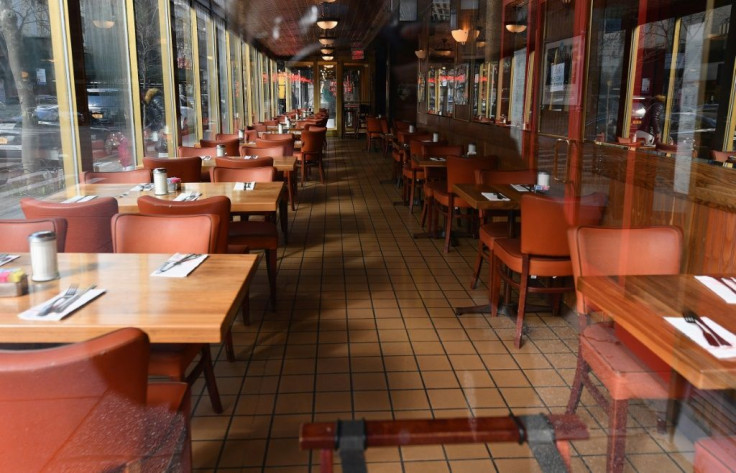Takeout, Delivery May Save Restaurant Industry Amid Coronavirus Restrictions

KEY POINTS
- Restaurants will need access to bridge loans and low-cost financing to survive restrictions imposed by government officials
- Fast-food and fast-casual restaurants are best positioned to survive
- Restaurants are an $899 billion industry employing 15.6 million
Depending on how quickly restaurants can pivot to take-out and delivery from dining in will determine whether they survive the coronavirus pandemic as more government officials order dining rooms off-limits to the general public.
Governors and local officials in nearly two dozen states have ordered restaurants to close their dining rooms or severely limit the number of people who can patronize them at any given time to try to stem the spread of COVID-19, which has infected at least 7,323 U.S. residents and killed more than 115.
“The restaurant industry is one that operates at a high degree of risk under the best of times,” Mark Hamrick, senior economic analyst at Bankrate.com, said in an email to IBTimes.com. “These, unfortunately, have quickly evolved into the worst of times.”
Hamrick said restaurants will need access to bridge loans and low-interest financing to weather the crisis.
“When this is over, we will likely see a smaller scale industry with failures at both the national and local levels. How much of a reduction depends on the length and scale of the outbreak and the success of the response on the part of governments to provide assistance to both consumers and businesses alike,” he said.
Restaurants are an $899 billion industry, with more than 1 million locations and employing 15.6 million people.
Fast-food and fast-casual – quick service restaurants in the industry lingo – are best positioned to maintain growth. A recent report by Placer.ai showed increases in February between nearly 3% and 12% above year-ago levels with March on a similar trajectory despite growing restrictions.
“These jumps show signs of a resilient economy in the face of health concerns that are making headlines on a daily basis. It also runs directly counter to the notion that the entire retail economy is heading for a major downturn,” the report said, adding: “Coronavirus is not going to have a single blanket impact on all aspects of the economy or even the retail economy or food sector more specifically. Different industries and sections of industries will feel the impact in different ways, and this likely means there are those that won’t feel a change at all.”
Dave Bagley, managing director of Carl Marks Advisors, told IBTimes delivery has been a nice enhancement for quick-service restaurants, adding 4% to 5% to the bottom line without cannibalizing normal sales. Nonetheless, volume is expected to be drastically reduced through May or even July.
“Casual dining and upscale dining have been largely left out of this trend. Delivery takes away the potential for upselling appetizers, drinks and desserts, which has been a key to their success. Couple that with the lack of ambiance and dishes that aren’t cooked with delivery in mind, and delivery is just a distraction for these restaurants,” he said.
“With so many restaurants unable to meaningfully execute on delivery, many will shut down or outright fail. We have seen 50% to 60% declines in some concepts, and even 90% in the Seattle area. However, for those where dine-in is limited, … I think delivery will carry them through. Other quick-service with a strong dine-in presence … will be down but business will remain brisk.”
It's not just the restaurants themselves that need to make adjustments.
“We need large companies [at all stages of the value chain] that can continue to pay their employees to do so; we need landlords who can postpone collecting rent to do so; we need producers and suppliers to continue to produce and supply; we need guests to continue to patronize businesses to the best of their ability; and we need owners, managers, and employees who can work to continue to work. And of course, all this needs to happen while we protect the health and safety of one another,” said Alex Susskind, professor and associate dean for academic affairs at Cornell School of Hotel administration.
San Zietz, CEO of GRUBBRR, predicted a side-effect of the pandemic will be the demise of the cashier at establishments that already had been moving toward kiosk sales.
“The industry was moving towards the cashier becoming obsolete, but that timetable has dramatically sped up with the recent coronavirus issue. We’ve seen that customers are reluctant to get close to other people due to social distancing and prefer using a kiosk or other ordering system rather than speaking with a cashier,” Zietz said.
“Businesses will quickly realize that kiosks and automated ordering systems provide major advantages that are proven to improve customer experience by 38%. These kinds of technologies will streamline the ordering processes and enable cashiers to focus efforts/attention on other parts of the business, whether it’s cleaning, customer service or something else.”
© Copyright IBTimes 2024. All rights reserved.




















